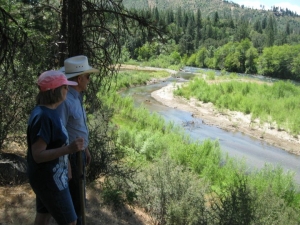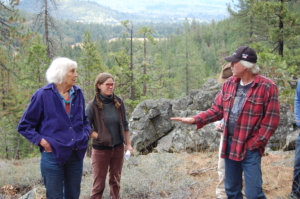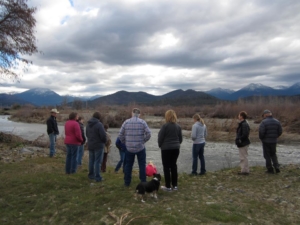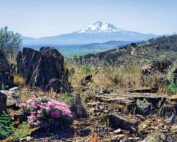WAYS TO PROTECT YOUR LAND
 Siskiyou Land Trust works with willing landowners to protect their land in perpetuity. The conservation easement, whether donated or purchased, is the most common tool we use to protect land in Siskiyou County. We often work with families who have been on the land for generations who have a vision for how they want to permanently conserve the places they value. Siskiyou Land Trust will also accept land donations under specific circumstances. Read more below to learn about the tools available to land owners in partnership with SLT.
Siskiyou Land Trust works with willing landowners to protect their land in perpetuity. The conservation easement, whether donated or purchased, is the most common tool we use to protect land in Siskiyou County. We often work with families who have been on the land for generations who have a vision for how they want to permanently conserve the places they value. Siskiyou Land Trust will also accept land donations under specific circumstances. Read more below to learn about the tools available to land owners in partnership with SLT.
WHAT IS A CONSERVATION EASEMENT?
The Land Trust Alliance describes a conservation easement this way: “A conservation easement is a voluntary legal agreement between a landowner and a land trust or government agency that permanently limits uses of the land in order to protect its conservation values. Landowners retain many of their rights, including the right to own and use the land, sell it and pass it on to their heirs.”
Conservation easements are often described using the bundle of sticks real estate analogy. Think of owning land as holding a bundle of sticks that represent the landowner’s right to do something with their property. Those rights include the right to build a home, subdivide the land, extract minerals, lease the property, and pass it on to heirs. Through a conservation easement, a landowner may give up certain development rights, or sticks from the bundle, associated with their property. A conservation easement “runs with the land”, meaning that it is attached to the property forever and that all future landowners are subject to the terms of the easement. Siskiyou Land Trust works with each landowner individually to tailor the conditions of the conservation easement to reflect the property’s conservation values and landowner goals.
When a landowner places a conservation easement on a property it becomes part of the property title in perpetuity. The Land Trust ensures that the conditions of the easement are honored by future landowners through relationships with those owners, site visits and annual monitoring.
Siskiyou Land Trust has a Board restricted Stewardship Endowment Fund to ensure the long-term protection of our land and easements by providing working capital to finance our stewardship needs. Siskiyou Land Trust requires landowners to pledge a monetary gift of support to our stewardship fund. Typically this landowner contribution is 6% of the value of easement or land. These gifts help ensure the legacy envisioned is successfully carried out by the Land Trust.
HOW IS A CONSERVATION EASEMENT VALUED?
The value of a conservation easement is the fair market value of the property minus the value of the property with a conservation easement on it, as determined by a qualified appraiser. Typically, more restrictive easement terms and higher local development pressure increase the value of a conservation easement. For example, Bob Smith owns land appraised at $1,000,000. With a conservation easement on the property it is worth $600,000. That means the value of the conservation easement is $400,000. Bob Smith can donated that easement to the Land Trust or sell it to a government agency through grant-funded programs. Typically, the land owner is responsible for the cost of the appraisal.
DONATED CONSERVATION EASEMENTS
 The most common type of conservation easement is a donated easement, in which the landowner donates the full value of the easement. This can often be used for substantial tax benefits to the landowner, if the donation provides some public benefit by permanently protecting important conservation resources, such as wildlife habitat, scenic beauty and views, clean water, working agricultural and forest lands, and meets other tax code requirements. Siskiyou Land Trust assists the land owner in crafting the terms of the easement and completing the transaction.
The most common type of conservation easement is a donated easement, in which the landowner donates the full value of the easement. This can often be used for substantial tax benefits to the landowner, if the donation provides some public benefit by permanently protecting important conservation resources, such as wildlife habitat, scenic beauty and views, clean water, working agricultural and forest lands, and meets other tax code requirements. Siskiyou Land Trust assists the land owner in crafting the terms of the easement and completing the transaction.
PURCHASED CONSERVATION EASEMENTS
Siskiyou Land Trust can also work with landowners to secure funding to purchase a conservation easement from landowners. Purchasing easements generally requires a longer time period (at least 3 years) in which to complete the transaction and the tax benefits to the landowner may be reduced or eliminated as compared to a donated easement. This lengthy process includes grant applications, typically to multiple state and federal agencies, that are very competitive. SLT’s Lands Acquisition Committee reviews all potential projects for grant funded conservation easements and selects those to be placed in our project pipeline. It may take several years for a proposed project to reach the active project status. Grant funded conservation easements are reserved for large properties that have significant conservation values.
BENEFITS OF A CONSERVATION EASEMENTS
In addition to the satisfaction landowners get from knowing their land is protected in perpetuity, there are also several potential tax advantages to granting a conservation easement: an income tax deduction; an estate tax benefit; and, possibly, a reduction in property taxes. A conservation easement donation that meets certain federal tax code regulations – that is, one that is perpetual, is given to a qualified conservation organization and is given “exclusively for conservation purposes” – can qualify as a tax-deductible charitable gift. (See Internal Revenue Code Section 170(h)(1)). By removing or decreasing a property’s development potential, a conservation easement may also result in the reduction of property taxes in some states and estate tax benefits for the landowner and his or her heirs. (Landowners should consult a tax attorney and additional reference materials for more information on the potential tax benefits of donating a conservation easement.)
LAND DONATION
 Siskiyou Land Trust may also accept gifts of land that have significant natural, scenic, or agricultural resources, which the organization can use as a nature preserve or demonstration working land. A donation of land to a land trust can be an effective conservation strategy for one who does not wish to pass land on to heirs; owns highly appreciated property; no longer uses the land they own; wishes to reduce estate tax burdens; or are no longer willing or able to manage and care for the land. By donating land to a land trust, an owner may realize substantial income and estate tax benefits while avoiding capital gains taxes that may have resulted from the sale of the property.
Siskiyou Land Trust may also accept gifts of land that have significant natural, scenic, or agricultural resources, which the organization can use as a nature preserve or demonstration working land. A donation of land to a land trust can be an effective conservation strategy for one who does not wish to pass land on to heirs; owns highly appreciated property; no longer uses the land they own; wishes to reduce estate tax burdens; or are no longer willing or able to manage and care for the land. By donating land to a land trust, an owner may realize substantial income and estate tax benefits while avoiding capital gains taxes that may have resulted from the sale of the property.
Land can be given to a land trust as an outright donation, or it can be donated to a land trust in a number of other ways, such as through a remainder interest or a bequest (more properly called a “devise”). Most land is donated to land trusts for its important conservation values and is protected in perpetuity; however, commercial and residential property can also be donated to a land trust with the understanding that it will be sold to support the organization’s conservation work.
ESTATE PLANNING
Landowners can include Siskiyou Land Trust in their estate plans. Landowners can leave property or a conservation easement to Siskiyou Land Trust in their will. We appreciate and understand the generous motivations of such gifts, as well as the commitment to future generations they provide. We request the courtesy of working with landowners during their lifetimes on such transactions to ensure their objectives will be realized and also to have the opportunity to thank the donor for their generosity.




